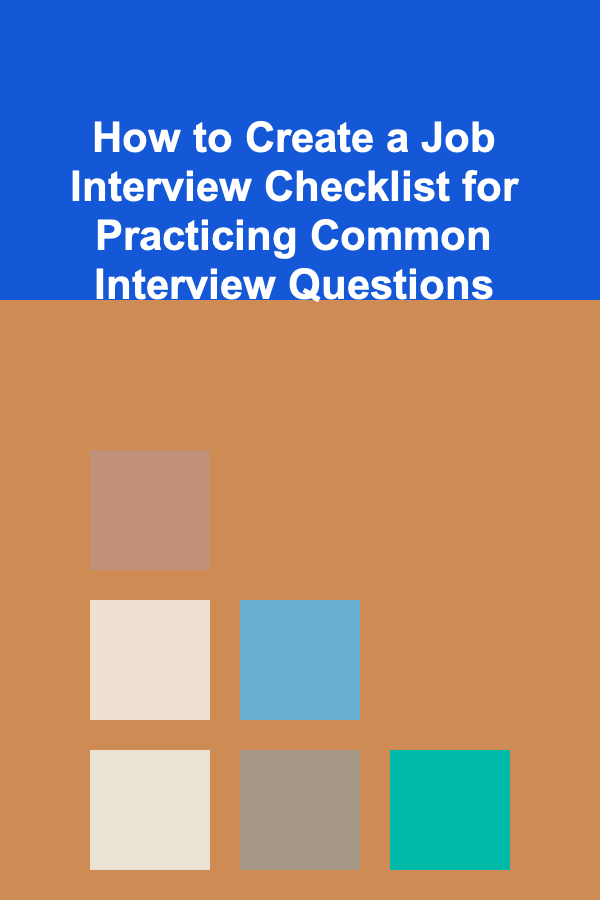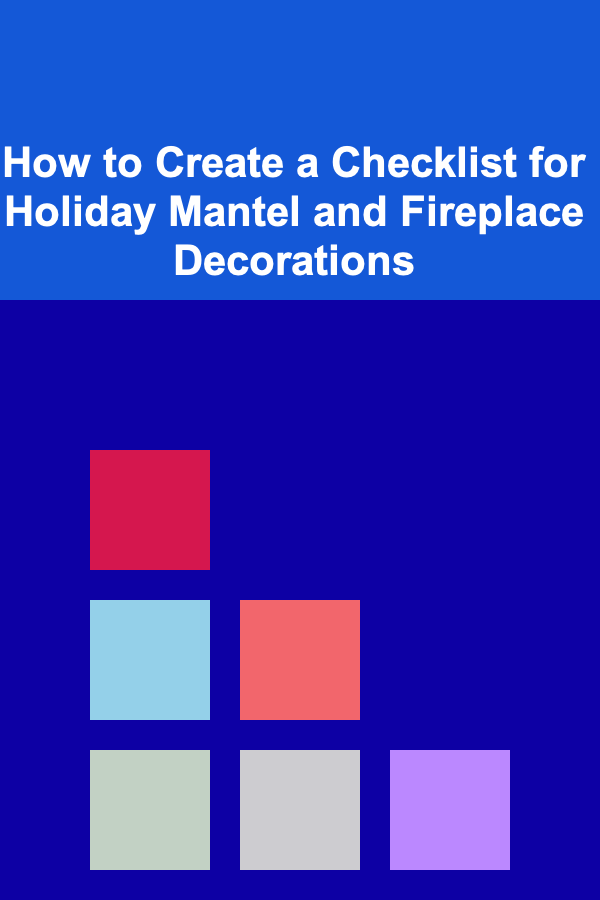
How to Create a Job Interview Checklist for Practicing Common Interview Questions
ebook include PDF & Audio bundle (Micro Guide)
$12.99$5.99
Limited Time Offer! Order within the next:

Preparing for a job interview is often a stressful and time-consuming process. One of the key components of successful preparation is practicing common interview questions. Knowing the right answers is important, but understanding how to frame those answers in a way that showcases your skills, experience, and fit for the role is even more critical. A job interview checklist can be an invaluable tool to streamline your preparation, making sure you cover all the important aspects of the interview process.
In this actionable guide, we'll walk you through how to create a comprehensive job interview checklist for practicing common interview questions. By the end, you'll have a solid framework to approach your interview preparation methodically, ensuring you're confident and ready to impress your potential employer.
Step 1: Research Common Interview Questions
Before diving into the specifics of creating a checklist, it's essential to familiarize yourself with the most common job interview questions. These questions are typically designed to assess your qualifications, character, and fit for the company culture.
Key Categories of Interview Questions:
-
General Questions: These questions help the interviewer learn more about you as a person.
- "Tell me about yourself."
- "Why do you want to work here?"
- "What are your strengths and weaknesses?"
-
Behavioral Questions: These questions aim to assess how you've handled situations in the past, based on the idea that past behavior is the best predictor of future behavior.
- "Tell me about a time when you had to deal with a difficult colleague."
- "Describe a time when you showed leadership."
- "Give an example of how you solved a problem at work."
-
Situational Questions: These questions ask you to predict how you might react to a future scenario. They assess your problem-solving and decision-making abilities.
- "How would you handle a situation where you missed a deadline?"
- "What would you do if you disagreed with your manager's decision?"
-
Technical Questions: These questions test your knowledge and skills related to the specific job you are applying for.
- "What programming languages are you proficient in?"
- "How do you handle tight deadlines in a high-pressure environment?"
-
Company and Role-Specific Questions: These questions explore your interest in the role and the company, as well as how well you understand its mission and values.
- "What do you know about our company?"
- "Why do you think you're a good fit for this position?"
By understanding the types of questions you may face, you can begin to craft your answers and practice responding with confidence.
Step 2: Organize Your Checklist
Now that you have an understanding of common interview questions, the next step is to create a structured checklist. This checklist will serve as your roadmap for preparation. It should be divided into sections that correspond with the categories of questions outlined earlier.
Example Structure for Your Interview Checklist:
-
General Questions
- [ ] Prepare a succinct and engaging answer for "Tell me about yourself."
- [ ] Develop a clear explanation of why you want the job.
- [ ] Identify your top strengths and weaknesses, and prepare examples to support them.
- [ ] Prepare to discuss your motivations and goals in your career.
-
Behavioral Questions
- [ ] Choose examples from your past work experiences that demonstrate leadership, teamwork, and problem-solving.
- [ ] Use the STAR (Situation, Task, Action, Result) method to frame your answers.
- [ ] Prepare a response to "Tell me about a time you faced a challenge at work."
- [ ] Think of a time you made a mistake at work and how you handled it.
-
Situational Questions
- [ ] Anticipate scenarios based on the role and prepare responses.
- [ ] Practice answering "How would you prioritize tasks if you were given multiple urgent assignments?"
- [ ] Prepare a response to "What would you do if you didn't agree with a team member's approach to a project?"
-
Technical Questions
- [ ] Review technical skills and competencies relevant to the job.
- [ ] Practice coding challenges, if applicable.
- [ ] Review any software, tools, or methods frequently used in the role.
-
Company and Role-Specific Questions
- [ ] Research the company's history, mission, values, and recent news.
- [ ] Prepare thoughtful questions to ask the interviewer about the company culture or team dynamics.
- [ ] Prepare an answer to "What excites you about this role and our company?"
- [ ] Understand how your experience aligns with the company's current needs.
Each section should focus on specific questions or topics that you are likely to encounter during the interview. This will help you ensure that you're fully prepared and not caught off guard.
Step 3: Practice Using the Checklist
Simply creating a checklist is not enough; you need to practice your responses thoroughly. Practicing your answers in a realistic setting will help you refine your responses and reduce interview anxiety.
Techniques for Effective Practice:
- Mock Interviews: Conduct mock interviews with a friend, family member, or mentor. This can simulate the pressure of the real interview and provide feedback on your answers.
- Record Yourself: Use a video camera or smartphone to record yourself answering questions. This allows you to review your body language, tone, and clarity of thought.
- Practice Aloud: Speaking your answers out loud helps you articulate your thoughts clearly and ensures that you're not stumbling over your words.
- Review and Adjust: After each practice session, review your answers and adjust them as necessary. Are your answers too long or too short? Do you need more specific examples or clearer explanations?
- Time Yourself: Ensure that your answers are concise and to the point. Most interviewers appreciate answers that are clear and direct, rather than overly lengthy responses.
As you practice, focus not only on the content of your answers but also on delivering them confidently. Remember that your body language, tone of voice, and eye contact are just as important as the words you say.
Step 4: Evaluate and Adjust Your Checklist
As you continue preparing for your interview, it's essential to regularly evaluate your progress. Review the checklist to ensure that all areas are covered, and make adjustments as needed.
Tips for Evaluation:
- Identify Weak Areas: After practicing, take note of any questions or categories that you struggle with. These are the areas where you need to focus more attention.
- Seek Feedback: Ask for feedback from those who conduct mock interviews with you. This external perspective can provide valuable insights into areas you might be overlooking.
- Tailor for Specific Roles: If you're applying for multiple jobs, tailor your checklist to each role. Some companies or positions might require more emphasis on specific skills, such as technical expertise or team collaboration.
By evaluating your preparation and making adjustments, you ensure that you're not only ready for common questions but also prepared to handle unexpected ones that might arise.
Step 5: Prepare Your Post-Interview Strategy
The interview doesn't end when you walk out of the room. A post-interview strategy can make a significant impact on how you're perceived by the interviewer and can even improve your chances of success.
Post-Interview Checklist:
- [ ] Send a thank-you email within 24 hours, reiterating your interest in the position and appreciating the opportunity.
- [ ] Reflect on your performance: What went well? What could you improve for next time?
- [ ] Stay organized by tracking each interview's status, including any follow-up tasks or deadlines.
Conclusion
Creating a job interview checklist for practicing common interview questions is one of the most effective ways to ensure you're fully prepared for an upcoming interview. By following this actionable guide, you'll be able to structure your preparation and cover all the key areas of the interview process, from general questions to company-specific inquiries.
Remember, the goal of preparation is not just to memorize answers, but to ensure that you can respond confidently and authentically. Use the checklist as a tool for continuous improvement, and don't forget to practice, review, and adjust your responses as needed. The more prepared you are, the better your chances of succeeding in your next job interview.
Reading More From Our Other Websites
- [Organization Tip 101] How to Set Up a Buddy System for New Campers
- [Home Family Activity 101] How to Plan a Family Storytelling Evening
- [Scrapbooking Tip 101] How to Incorporate Hand‑Lettered Calligraphy for Elegant Scrapbooking Titles
- [Personal Investment 101] How to Use Investment Apps to Track and Manage Your Portfolio
- [Home Rental Property 101] How to Handle Conflict Resolution Between Tenants in Shared Properties
- [Organization Tip 101] How to Store Vinyl Records and Music Equipment
- [Scrapbooking Tip 101] Creative Scrapbooking Layouts to Elevate Your Photo Stories
- [Home Family Activity 101] How to Have a Family DIY Craft Market at Home
- [Personal Care Tips 101] How to Use Hair Serum to Reduce Hair Loss
- [Home Budget Decorating 101] How to Choose Budget-Friendly Rug Ideas: Elevate Your Floors Without Breaking the Bank

How to Create a Checklist for Holiday Mantel and Fireplace Decorations
Read More
How to Create a Functional Entryway with Limited Space
Read More
How to Create a Garden Shed Organization System
Read More
How to Prevent and Maintain Your Home Against Water Damage
Read More
How to Update Your Bathroom Without a Full Remodel
Read More
Creating a Beautiful Flower Garden: A Comprehensive Guide
Read MoreOther Products

How to Create a Checklist for Holiday Mantel and Fireplace Decorations
Read More
How to Create a Functional Entryway with Limited Space
Read More
How to Create a Garden Shed Organization System
Read More
How to Prevent and Maintain Your Home Against Water Damage
Read More
How to Update Your Bathroom Without a Full Remodel
Read More